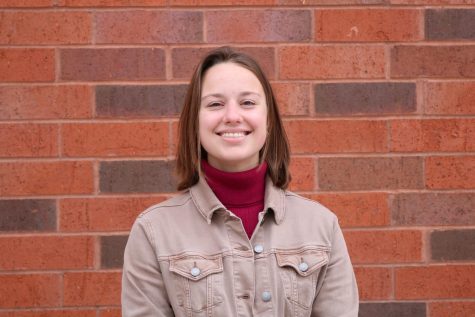Student-organized event recognizes women and LGBTQ composers
Local and student musicians performed several pieces to celebrate minority voices in music
The overhead lights in the recital hall softened as the performers filed onto the stage. They arranged themselves in a half circle, sharing half-smiles with each other. One nodded, and the music began. The students moved through chords, creating drops of dissonance and brief harmonies. There weren’t any lyrics to the song, just sustained tones. It ended as suddenly as it began.
Women and LGBTQ musicians and composers were honored at an event in Haas Fine Arts Center on March 21. The free concert was called Listen to Us Deeply: A Celebration of Women and Queer Composers.
Logan Crapser, a fourth-year women’s, gender and sexuality student organized the event.
“Allow all of your focus to be on the music, put all of the energy you can on what will be played tonight,” Crapser said to the audience. “And if you can do that, and we can meditate on these pieces and words, then we can start to create a different history that includes all of these voices and feel better about all of the stuff that’s going on in our world.”
Planning for the event began in October, and the event was meant to uplift women, LGBTQ and other marginalized voices in music, Crapser said.
Crapser said the inspiration for the event came from learning the work of Oliveros, who is a woman and LGBTQ composer. It was her piece the students sang to start the performances. The evening was dedicated to Oliveros, Audre Lorde, Cherrie Moraga, Gloria Anzaldua, Marsha P. Johnson, Sylvia Rivera and all female and LGBTQ composers.
Before the music continued, Crapser told the audience they should practice “deep listening,” a term coined by Oliveros. Deep listening is when one deeply engages with the music they hear. The practice includes listening to nature and one’s thoughts, and learning the difference between voluntary and involuntary listening.
Crapser said they hadn’t heard about Oliveros, even though they enjoy listening to the type of music she composed.
“Why was I deprived of the music of such an amazing person? We all know the unfortunate answer,” Crapser said. “She is a woman and she is queer.”
The night showcased the work of several local composers. Professor of composition Chia-Yu Hsu’s work was performed. Her piece is called “12 Signs.” Each movement is titled after an animal. The score seemingly personifies the viola as a musician plays. For example, the musician must move her bow frantically across the strings during the movement entitled “Rat.” During “Horse,” the musician knocks on her instrument to simulate the sounds of hooves.
There were also several ensemble performances. An all-women saxophone quartet performed “Bop,” by Jennifer Higdon, who is a woman and a member of the LGBTQ community.
A jazz ensemble performed a collection of tunes by Billy Strayhorn, a gay man of color who worked with Duke Ellington.
The Women’s Concert Chorale performed “What Happens When A Woman,” composed by Alexandra Olsavsky. The choir incorporated swaying dance moves and clapping. The sound of their voices filled the auditorium and bounced off the walls.
Free Garbage is a trio including two saxophones and a drum set. Crapser, the event organizer, is a part of the group. They wrote a piece entitled “A Little Bit of Both, But Entirely Neither.” Crapser said the multi-movement piece is a collaborative work. Crapser infused knowledge from women’s, gender and sexuality courses and their knowledge of music.
The group used movements to further their narrative. Their saxophones twinkled in the spotlights as they faced each other for the first few movements. For the final measures, they faced the audience.
Angel Peck, a UW-Stout student, said just coming to Listen Deeply shows her support of women and the LGBTQ community.
“To me personally,” Peck said, “I think this event, even though I am cisgender, it means showing up and giving people who don’t have a voice a voice and using my power to give minorities power.”
Bethany HaKari, a second-year healthcare administration student, said she enjoyed hearing new music from talented composers and musicians.
“I think it’s really important because it helps bring forward minority voices and music that we normally wouldn’t hear,” HaKari said, “and especially with composers that are so often forgotten and just pushed away in favor of others. I think it’s super important to hear this kind of music and be introduced to it when we might not have heard it otherwise.”
Neupert can be reached at neupercm7411@uwec.edu.

Neupert is a fourth-year journalism student at UW-Eau Claire. She is the executive producer of Engage Eau Claire on Blugold Radio Sunday. In her spare time, Neupert's working on becoming a crossword puzzle expert.

